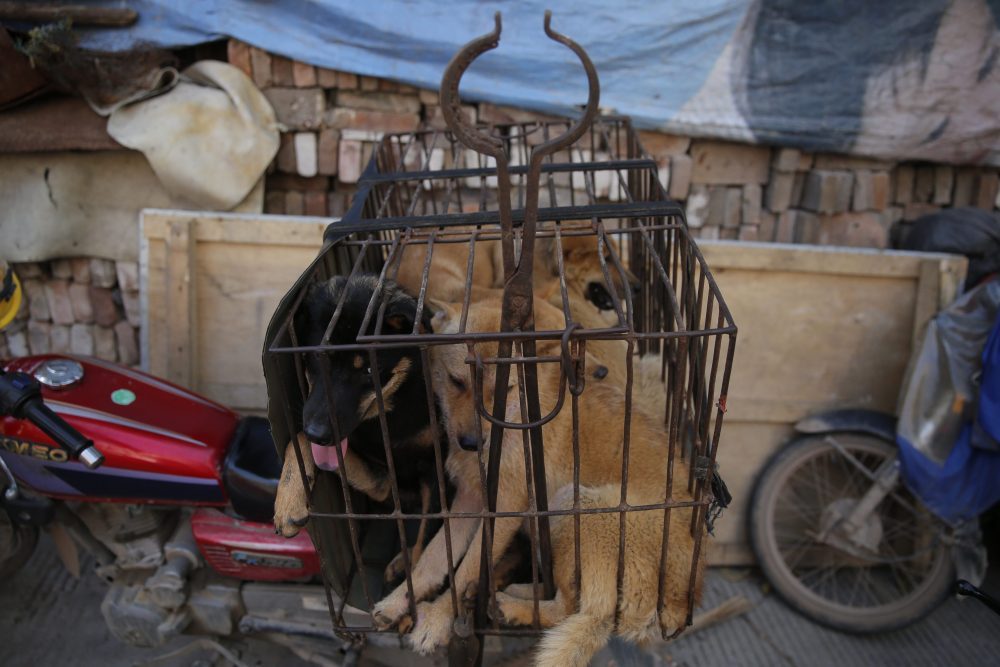NOTE: This article contains a photo that some readers might find disturbing. Please read at your own discretion.

Shenzhen has become the first city in China to ban eating cats and dogs as part of a wider effort to control the wet markets where the first animal-to-human transmission of the novel coronavirus likely occurred.
It’s believed the novel coronavirus disease, COVID-19, spread to humans from a bat consumed at a wet market in Wuhan, one of many niche markets across Asia. World health experts have long raised concerns about such markets, which offer a wide range of farmed and wild animals for consumption, including bats, pangolins, snakes, dogs and cats.
“Dogs and cats as pets have established a much closer relationship with humans than all other animals, and banning the consumption of dogs and cats and other pets is a common practice in developed countries and in Hong Kong and Taiwan,” the Shenzhen city government said in an order posted on Wednesday.
“This ban also responds to the demand and spirit of human civilization.”
Shenzhen, a city of 12.5 million people, is a major technology hub in southern China and sits across the water from semi-autonomous Hong Kong.
Chinese officials have started cracking down on wet markets amid international pressure over the latest outbreak, which comes less than two decades after SARS emerged under similar circumstances.
China’s top legislature said in February that it would ban the trade and consumption of wild animals. However, Shenzhen officials appear to be getting ahead of the game with their own ban, specifically targeting the consumption of cats and dogs.

Get breaking National news
An estimated 30 million dogs and 10 million cats are killed for their meat across Asia every year, according to Humane Society International (HSI). They’re something of a niche food, although Yulin, China, holds a dedicated dog meat festival every year.
Shenzhen officials say the new ban will come into effect on May 1.
Wildlife advocates applauded Shenzhen for the decision after it was announced.
“This really could be a watershed moment,” Dr. Peter Li, China policy specialist for HSI, told BBC.
Advocates with the Toronto-based World Animal Protection (WAP) group also applauded the move, while calling for China to go even further.
“This permanent ban will help to keep people safe and protect animals from unnecessary suffering,” Kelly Dent, WAP’s global director of external engagement, told Global News in a statement.
“However, if deadly outbreaks are to be prevented in future, we need to see this ban extended to include the use of wild animals for entertainment, for traditional medicine and as exotic pets. The coronavirus pandemic is the latest wake-up call that we must end the cruel exploitation of animals.”
“Shenzhen is the first city in the world to take the lessons learned from this pandemic seriously and make the changes needed to avoid another pandemic,” said Teresa M. Telecky, vice-president of the wildlife department for HSI.
“Shenzhen’s bold steps to stop this trade and wildlife consumption is a model for governments around the world to emulate.”
—
Questions about COVID-19? Here are some things you need to know:
Health officials caution against all international travel. Returning travellers are legally obligated to self-isolate for 14 days, beginning March 26, in case they develop symptoms and to prevent spreading the virus to others. Some provinces and territories have also implemented additional recommendations or enforcement measures to ensure those returning to the area self-isolate.
Symptoms can include fever, cough and difficulty breathing — very similar to a cold or flu. Some people can develop a more severe illness. People most at risk of this include older adults and people with severe chronic medical conditions like heart, lung or kidney disease. If you develop symptoms, contact public health authorities.
To prevent the virus from spreading, experts recommend frequent handwashing and coughing into your sleeve. They also recommend minimizing contact with others, staying home as much as possible and maintaining a distance of two metres from other people if you go out.
For full COVID-19 coverage from Global News, click here.
— With files from Reuters










Comments
Want to discuss? Please read our Commenting Policy first.